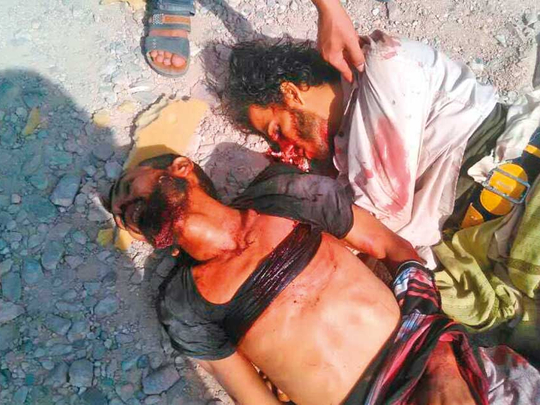
Al Mukalla: UAE-backed Yemeni Security Belt forces have killed two senior Al Qaida militants in the southern province of Abyan, scoring another victory in the battle against the militant group.
Hassan Basaria and Murad Doubali were killed in an intense gun battle after refusing to surrender in Al Wadhea district, the birthplace of Yemen’s president Abd Rabbo Mansour Hadi, the security unit said in a statement.
They had been involved in plotting attacks against local security forces.
Al Qaida has largely failed to resurface in their former strongholds as thousands of Yemeni troops, trained and armed by the UAE military in Yemen, assert control over key urban and rural areas in southern Yemen.
Meanwhile, Saudi-led coalition fighter jets have killed an Al Houthi navy commander responsible for smuggling arms and staging attacks against ships in the Red Sea.
Yemen Defence Ministry said on Wednesday that coalition fighter jets targeted a gathering of Al Houthi militants in the western port city of Hodeida, killing Mansour Ahmad Al Sa’adi and a number of his associates.
Al Sa’adi was described as an important Al Houthi smuggler and a commander of the movement’s navy soldiers who plotted attacks against military and humanitarian ships from the USA, UAE and Saudi Arabia.
The death of Al Sa’adi comes as the Iran-backed militia officially mourned the death of brigadier Nasser Al Qubari, a former Republican Guard, killed in an air strike by the coalition jets on Wednesday.
Precision air raids by the coalition’s fighter jets have killed dozens of Al Houthi commanders, including military aides to Al Houthi leader, Abdul Malik Al Houthi.
The Saudi-led coalition has intensified their ground and air offensive in the province of Hodeida in an attempt to cut off the remaining smuggling routes on the Red Sea under Al Houthi control.
Meanwhile, Yemen’s Defence Ministry mourned the death of Colonel Ali Abdullah Al Suaidi, the commander of Brigade 159, who was killed in clashes with Al Houthi militants on Al Abadia battlefield, east of the central province of Baydha.
Another pro-government field commander, Mohammad Jawas, was killed after attacking Al Houthi-controlled sites in Al Shareja, north of Lahj province.
The Defence Ministry said coalition fighter jets carried out dozens of air strikes in Taiz and Serwah, Baydha and Sa’ada, striking Al Houthi military equipment and gatherings and killing dozens of militants.
The coalition massive air support is credited for turning the tide of the current war in favour of government forces.
The Saudi-led Arab coalition entered the Yemeni war in 2015 just months after an Al Houthi coup forced internationally-recognised Yemeni president Abd Rabbo Mansour Hadi out of power.
He later was able to escape house arrest and flee to Aden where he temporarily shifted government headquarters.
Since then, the coalition has gained back 86 per cent of Yemeni territory but major population centres still remain under Al Houthi control.
Saudi Arabia and the US have accused Iran of illegally smuggling weapons into Yemen to sustain Al Houthi war efforts.
In December, one such Iranian-made ballistic missile was fired towards Riyadh for the first time in the three-year war.
Although it was intercepted, Riyadh called it an ‘act of war’.
The war has cost the lives of thousands of Yemenis and pushed the Arab world’s poorest country to the brink of famine.
The latest government push seeks to take advantage of cracks in the awkward Al Houthi alliance with former Yemeni President Ali Abdullah Saleh’s supporters.
Saleh ruled Yemen for more than three decades until he was forced to resign following an Arab Spring uprising in 2011.
He remained in the country, however, and continued to wield power from behind the scenes.
In 2014, his forces allied with Al Houthi militia, despite the fact that as president he had gone to war with them.
There had been simmering tensions between the two awkward allies in past months that boiled over in December when Saleh suggested he would cooperate with Hadi — he was assassinated shortly after.
Since then senior members of Saleh’s party have either been executed or placed under house arrest by Al Houthis amid a draconion crackdown.
The broken alliance between Al Houthis and forces loyal to Saleh appears to be permanent, which will help the Yemeni government and its backers in the Saudi-led coalition weaken their grip on the country given the reduction in manpower.
In a recent meeting with New York Times editors, Saudi Crown Prince Mohammad Bin Salman said that Al Houthis have become increasingly isolated politically.
He dismissed the seven missiles Al Houthis fired at Saudi Arabia from Yemen on March 25 as “a last-ditch effort” that only showed they were weak.
Saudi Arabia, he said, is now seeking to end the war through a political process, trying to divide Al Houthis and maintaining military pressure on them.











